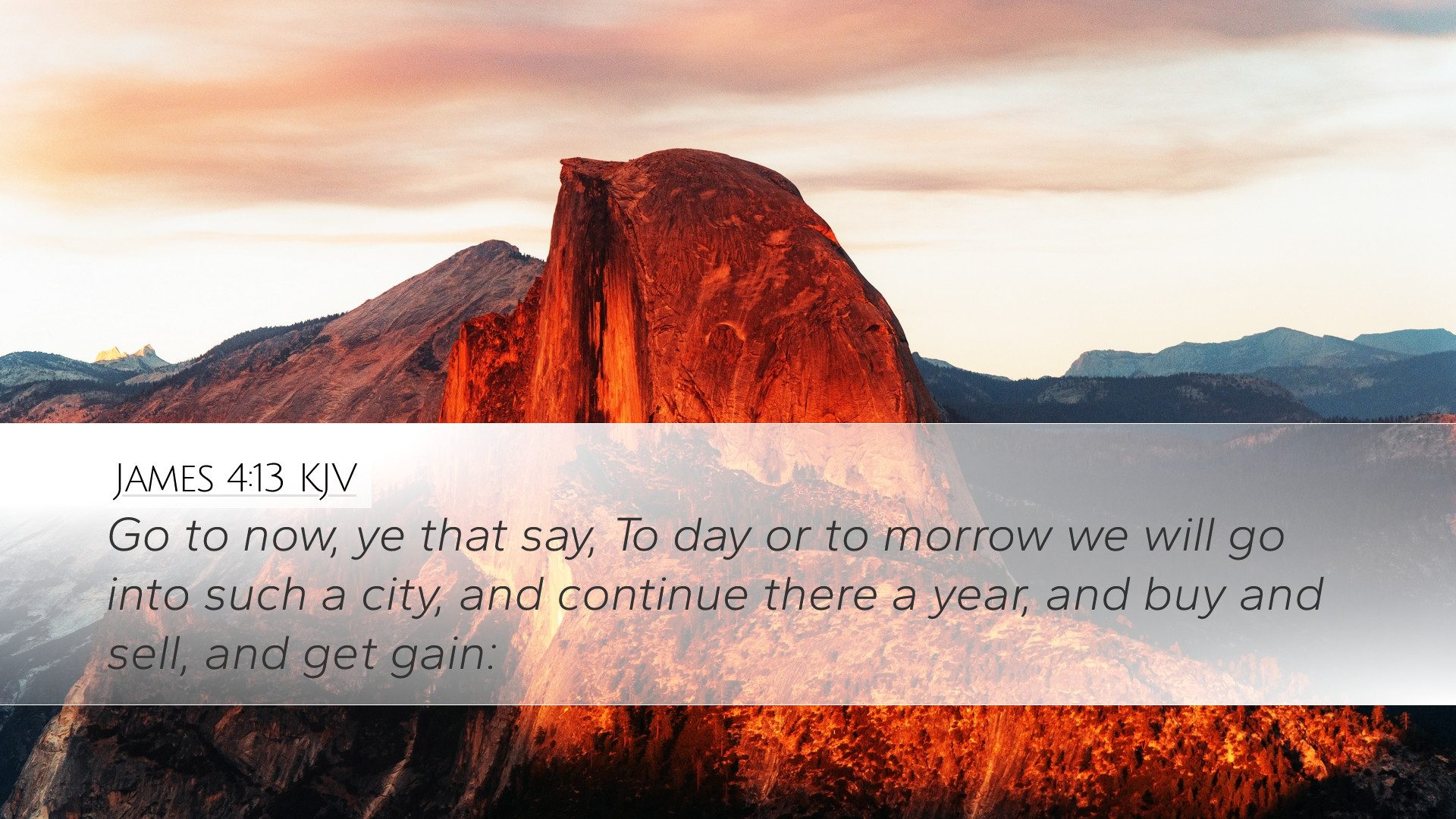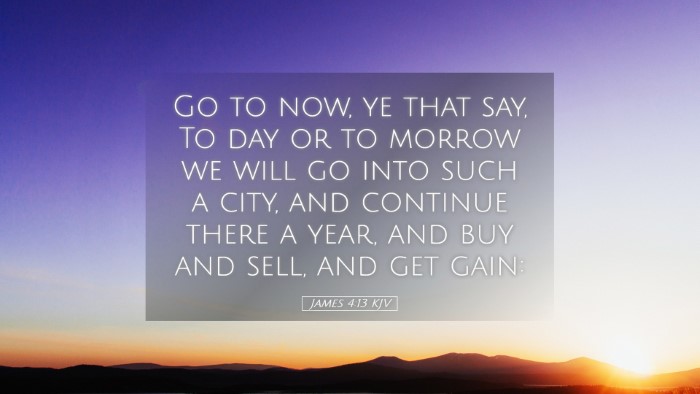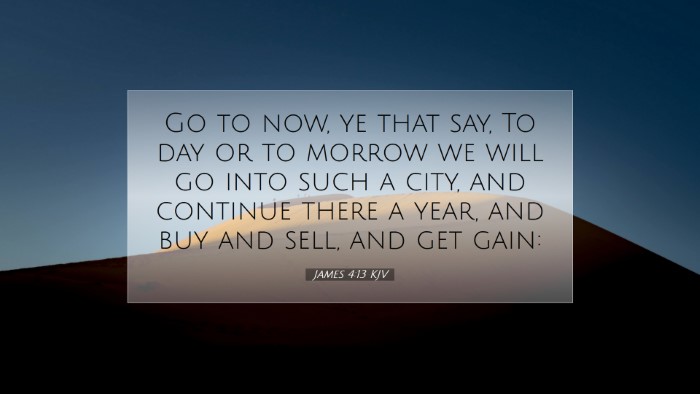Old Testament
Genesis Exodus Leviticus Numbers Deuteronomy Joshua Judges Ruth 1 Samuel 2 Samuel 1 Kings 2 Kings 1 Chronicles 2 Chronicles Ezra Nehemiah Esther Job Psalms Proverbs Ecclesiastes Song of Solomon Isaiah Jeremiah Lamentations Ezekiel Daniel Hosea Joel Amos Obadiah Jonah Micah Nahum Habakkuk Zephaniah Haggai Zechariah MalachiJames 4:13
James 4:13 KJV
Go to now, ye that say, To day or to morrow we will go into such a city, and continue there a year, and buy and sell, and get gain:
James 4:13 Bible Commentary
Commentary on James 4:13
Verse: "Go to now, ye that say, To day or to morrow we will go into such a city, and continue there a year, and buy and sell, and get gain."
Introduction
The verse from James 4:13 serves as a pertinent reminder of the fragility of human planning against the backdrop of God's sovereignty. It highlights the inclination to boast about future plans while ignoring the uncertainty of life. This commentary seeks to consolidate insights from esteemed public domain commentaries to foster a deeper understanding of this passage.
Contextual Analysis
James, the brother of Jesus, writes to Jewish Christians, providing practical wisdom amidst their struggles. The focus here is on addressing the presumptive attitude of those who make extensive plans without considering the will of God. The admonition serves to reflect upon the transient nature of earthly life and the need to submit future endeavors to the Divine will.
-
Matthew Henry:
Henry emphasizes the folly of making presumptuous plans. He states that such boasting arises from a heart filled with pride, assuming control over future events without recognizing God’s omnipotence.
-
Albert Barnes:
Barnes elaborates on the significance of the phrase "Go to now," indicating a direct rebuke to those who disregard God's plan. He points out that the emphasis is on the uncertainty of life – a theme recalling the words of Proverbs 27:1.
-
Adam Clarke:
Clarke highlights the cultural context, noting that city commerce was a common pursuit. He warns that the verse targets those who partake in worldly ambitions without spiritual consideration, reminding believers of the temporality of their earthly endeavors.
The Nature of Presumption
This passage confronts the presumption found in human plans. The specific intention to travel, trade, and profit reveals a calculated approach to life that prioritizes material gain over spiritual dependence.
-
Matthew Henry:
Henry outlines that the problem lies not in planning itself but in the arrogant assumption that such plans will surely come to fruition. He asserts that it is essential to recognize that human endeavors operate under divine providence.
-
Albert Barnes:
Barnes notes that economic pursuits are not inherently evil; rather, it is the attitude of self-sufficiency and independence from God that is problematic. Acknowledging God in one’s plans is essential for a fruitful life.
-
Adam Clarke:
Clarke underscores the necessity of incorporating spiritual discernment into all aspects of life, particularly concerning future intentions. He states that every plan should be rooted in prayer and reflection upon God’s will.
Submission to God’s Will
James 4:13 inherently calls for believers to submit their plans to God's will. The following insights explore the importance of this submission in the life of a Christian.
-
Matthew Henry:
Henry articulates that submission to divine will is a mark of true wisdom. By recognizing God’s authority in shaping the future, believers affirm their trust in His omniscience and benevolence.
-
Albert Barnes:
Barnes reinforces that this submission requires a heart posture of humility, acknowledging our limitations and the unpredictability of life. True wisdom, according to Scripture, involves understanding one’s place in the world.
-
Adam Clarke:
Clarke emphasizes prayerful consideration of decisions, suggesting that believers should seek divine guidance in every aspect of their lives. A prayerful approach transforms plans into opportunities for God’s glory.
The Specifics of 'Tomorrow'
The phrase "to day or to morrow" brings attention to the temporality of human existence. The uncertain nature of tomorrow serves as a reminder of the briefness of life, calling believers to action in the present moment.
-
Matthew Henry:
Henry notes that "tomorrow" signifies the expectation of time, yet it remains uncertain. He warns against procrastinating spiritual commitments in favor of earthly pursuits, which can lead to spiritual neglect.
-
Albert Barnes:
Barnes points to the need for immediacy in obeying God’s commands. He argues that failing to act upon what is good today is akin to presuming upon tomorrow – a neglect of the present opportunity.
-
Adam Clarke:
Clarke reflects on the importance of the present time for salvific work. Today's actions set the stage for tomorrow's outcomes, emphasizing that readiness to serve God should take precedence over worldly plans.
Conclusion and Application
James 4:13 serves as a powerful reminder of the need for humility and dependence on God in our planning processes. As believers, we are urged to align our ambitions with the divine will, recognizing the limitations of our understanding and the overarching sovereignty of God.
For pastors, theologians, and students of the Scripture, this passage invites reflection on the character of our plans and the necessity of integrating prayer and contemplation into the fabric of our daily lives. It challenges the reader not only to avoid presumptive statements regarding future endeavors but also to acknowledge that each day is a gift that should be dedicated to the service of God.
Let this scripture not provoke merely a sense of discomfort at human pride but ignite a deeper pursuit of God’s wisdom and guidance. In doing so, we embrace a lifestyle that is fully dependent on the Lord, ensuring that our paths are directed according to His purpose.


